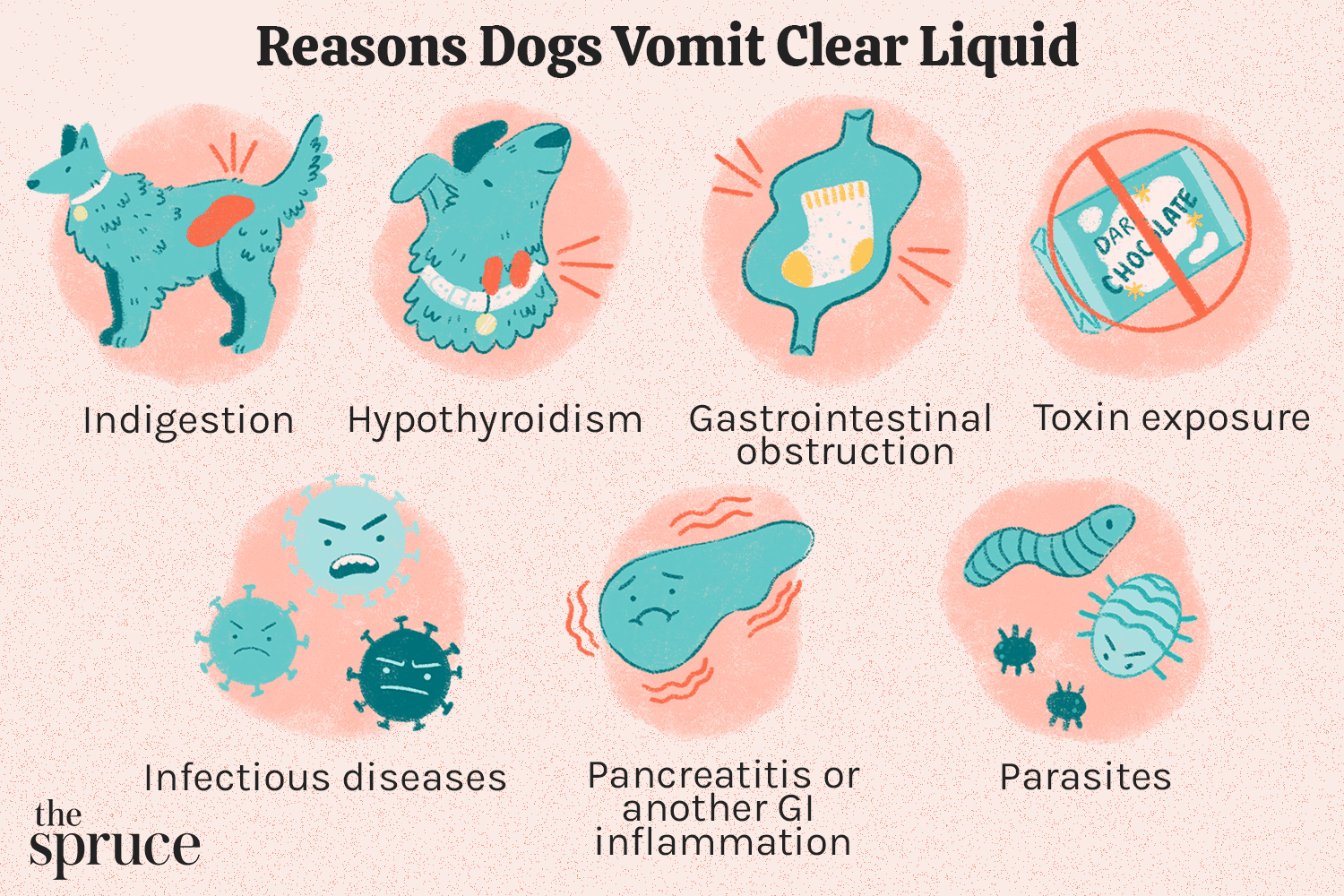If your dog is throwing up clear liquid or water, you are probably concerned about what to do next. Some dogs will vomit once in a while, but repeated vomiting requires some attention. Dog vomit can appear clear, brown, bloody, white, or yellow. It may or may not appear foamy. Determining whether a dog vomiting clear liquid is a problem depends on the other symptoms and the frequency at which it's happening. Here's what you need to know if your dog is vomiting clear liquid or water.
Why Do Dogs Vomit Clear Liquid?
Clear liquid vomit generally consists of saliva or water and may also have a foamy appearance. One simple explanation for vomiting clear liquid is that the dog drank too much water or drank water too quickly. Of course, there are other possible reasons for the vomiting, so don't assume it's nothing.
Clear liquid does not necessarily mean water or saliva. Your dog could have ingested something clear that cannot be digested.
If the vomiting happens only a few times and stops on its own without other signs of illness, then there is little cause for concern. However, any kind of vomiting may be a sign of a more serious problem, especially if it occurs frequently.
There are many possible reasons why your dog is vomiting clear liquid.
- Indigestion (often due to dietary indiscretion, overeating, over-drinking, etc.)
- Hypothyroidism
- Gastrointestinal obstruction
- Toxin exposure
- Infectious diseases
- Pancreatitis or another GI inflammation
- Parasites
What to Do If Your Dog is Vomiting Clear Liquid
If your dog vomits clear liquid just once for no apparent reason, there is no need for alarm. Watch your dog for lethargy, diarrhea, loss of appetite, weakness, and other signs of illness. Look around your home for evidence of toxin exposure or foreign body ingestion.
If your dog seems otherwise normal, keep watching for more vomiting. If your dog vomits again, skip the next meal and continue to observe. Offer the next scheduled meal after skipping one and continue to watch for vomiting and other signs of illness. Contact your veterinarian for advice if your dog vomits again.
Contact your veterinarian if daily vomiting continues for more than a day or if your dog vomits more than two times within 24 hours. You should also contact your vet if other signs of illness appear.
Treatment for Vomiting in Dogs
If the vomiting continues, then it's time to see a veterinarian. Your vet will discuss your dog’s recent and long-term medical history. Be sure to share all information about your dog's current medications and diet. Remember to bring up anything you think your dog might have eaten, such as plants, chemicals, or dangerous foods.
Your vet will perform a thorough examination of your dog. Next, the vet may recommend diagnostic tests to look for the cause of the vomiting. This usually includes blood and urine testing, radiographs (X-rays), and possibly an ultrasound.
The recommended treatment will be based on the results of diagnostic testing. In many cases, your dog will be treated with anti-nausea medications, antacids, and/or GI protectant drugs to provide relief. Your vet may opt to administer the first doses in an injectable form to avoid further vomiting.
If your vet suspects a GI obstruction, then surgery or endoscopy may be necessary to explore and remove the obstruction. Your vet may be able to perform one of these procedures. Alternatively, you might be referred to a veterinary specialist, depending on the situation. A hospital stay will likely be necessary after the procedure.
If your vet thinks your dog was exposed to a toxin, then treatment will be specific to that toxin. This may involve contacting animal poison control, administering activated charcoal, or other remedies. Your dog may need to be hospitalized for this treatment.
Your dog will likely need to be hospitalized if your vet is concerned about other issues like dehydration, pancreatitis, and infectious diseases. During hospitalization, your dog may be given intravenous fluids and frequent medication dosing while being observed in the hospital.
How to Prevent Vomiting in Dogs
Sometimes there is no way to prevent vomiting in your dog as some illnesses occur with no known cause.
The good news is that there are a few things you can do to keep your dog healthy and lower the risk of problems like vomiting:
- Keep plants, chemicals, human food, and any other toxins out of reach.
- Prevent your dog from licking, chewing, and eating dangerous things.
- Visit the vet for routine wellness exams once or twice per year (as recommended by your vet).
- Feed a healthy diet and keep treats to a minimum.
Always be sure to contact your veterinarian when you first start seeing signs of illness. If you wait, your dog may get much worse. When in doubt, head to the nearest open vet office.
:max_bytes(150000):strip_icc()/jenna-stregowski-tsp-bio-page-300fa370d15f4fb1ae407340bb7ea3ae.png)
:max_bytes(150000):strip_icc()/Bartley-04eef3b80b55445b9684616139b9239e.jpg)

